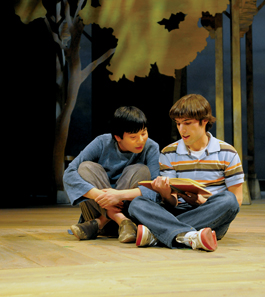home | metro silicon valley index | the arts | stage | review

Photograph by Kevin Berne
CHILDHOOD BOND: Hassan (left, Lowell Abellon) and Amir (Craig Piaget) are best friends in prewar Kabul.
On High
San Jose Rep brings Khaled Hosseini's 'Kite Runner' to the stage
By Jessica Fromm
THE ANCIENT Afghan sport of kite flying bookends the heart-wrenching narrative of The Kite Runner, uplifting the stage version of the bestselling novel about friendship, love, lose, guilt, atonement and redemption. In its world-premiere theatrical adaptation at San Jose Repertory Theater, The Kite Runner is an outstanding production with exceptionally realistic descriptions of emotions, if not situations. Based on the story by San Jose's Khaled Hosseini, The Kite Runner offers insights into Afghan culture, the inescapably shocking sadness of the war-torn country's political history and its long-term implications on the human psyche. Adapted for the stage by SJSU professor Matthew Spangler, the play is a tale told in two parts, the first one being the stronger.
The action takes place in peaceful 1970s Kabul, where 12-year-old Amir (Craig Piaget) and his best friend, Hassan (Lowell Abellon), bask in the simplicity of childhood. Although Amir is a rich Pashtun boy and Hassan is his lowly Hazara servant, the two boys have an inseparable bond, spending their summer afternoons flying kites, climbing trees and reading. Amir, the son of a local businessman, Baba (Thomas Fiscella), yearns for his father's love and approval and secretly despises him for showering Hassan with affection.
Abellon and Piaget are superb in their roles as the two young friends. Piaget conveys Amir's giddy innocence, fidgeting with excitement at the kite flying tournament and horsing around with abandon. Abellon's plucky Hassan is more serious and mature in his expressions, a boy more down to earth than flighty Amir. Their story is narrated by the adult Amir (Barzin Akhavan), who stands onstage clarifying in the past tense what is going on inside the head of young Amir as tragic events unfold and his cowardice changes the course of everybody's lives forever.
Scenic designer Vicki Smith uses a simple set with strong yellows and tans to situate the play in the sun-drenched barren lands of prewar Afghanistan, while the rhythmic percussion of the tabla (an Indian drum), played live onstage by Salar Nader, helps propel the action. Like all stage adaptations of acclaimed books, there is a huge amount of backstory and context to shoehorn into a comparatively brief time span. So much narrative is squashed to fit into a modest running time that a certain amount of depth of the boys' friendship is lost. The play's nearly three-hour run time becomes tiresome in the final stretch, the exact time when the audience should be riveted by Amir's final act of redemption. The production (directed by David Ira Goldstein) would benefit from cutting a half-hour of extraneous subplotlines. The play, like the book, is also marred by a ridiculous, overblown ending that sends the second half of the story line totally off a cliff. The final confrontation comes off cartoonish when it should be horrifying, somehow turning the most terrorizing of regimes, the Taliban, into extravagant movie bad guys. Staying true to traditional plot formula, Amir gets a second chance at the end of The Kite Runner. We can only pray that the fate of Afghanistan turns out likewise.
THE KITE RUNNER plays Tuesday at 7:30pm, Wednesday at 11am (April 1 only) and 8pm, Thursday–Friday at 8pm, Saturday at 3 and 8pm and Sunday at 2pm through April 19 at the Rep, 101 Paseo de San Antonio, San Jose. Tickets are $27–$48. (408.367.7255)
Send a letter to the editor about this story.
|
|
|
|
|
|